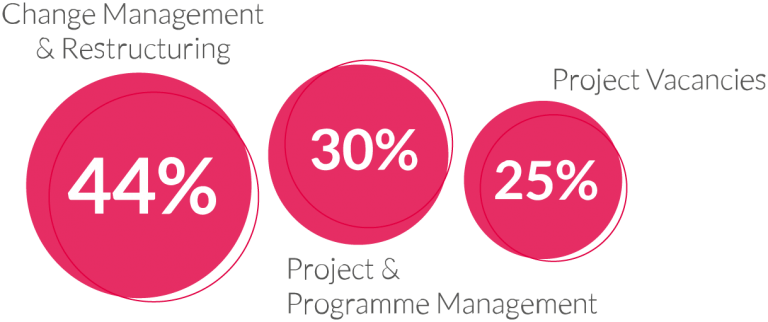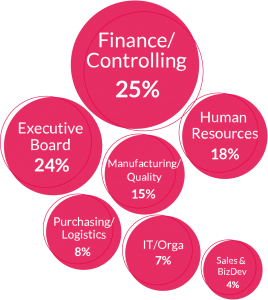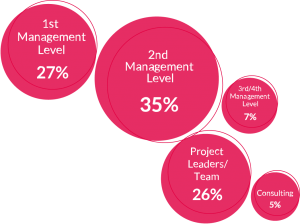When is
interim management used?
Much more often than you think!
In our experience, companies hire interim managers to bring in key management, leadership and/or technical skills for a limited period of time, usually to address specific needs such as staff shortages, implementation of a new software solution, restructuring of entire departments, optimisation of process flows, corporate reorganisations or closures, and to improve company results.
In many situations, the use of interim managers is advantageous and helps the company to reposition itself. Because here, interim managers with their wealth of experience offer many advantages, such as:
Custom-fit management resource
If companies do not have the competence for outstanding projects within their own ranks and cannot keep them on hand because they do not need them permanently, interim managers are the ideal solution. Medium-sized companies in particular find it difficult to anticipate all the challenges posed by globalisation, digital transformation and social change and to react quickly. The use of interim managers offers them the opportunity to buy in highly specialised expertise on a temporary basis and as needed to deal with situations for which they normally do not have the expertise in-house. Whether it is the opening up of new markets or products or the implementation of a merger or takeover, one can always find suitable experts who have often successfully implemented such projects.
Objective view
Difficult company situations can often be better managed with a neutral view from the outside. Here it makes sense to use an interim manager who, as a neutral person without his own agenda, analyses the situation and introduces solution steps. With their many years of specialist and management knowledge, interim managers are in a position to enable company decision-makers to look beyond their own horizons and implement the solutions operationally together with them.
Successfully overcoming crisis situations
Interim managers can successfully avert crisis situations in companies in an advisory capacity. In order to solve existing problems and work more productively in the future, solution concepts are developed after identifying and investigating the causes, which the interim manager then implements operationally with the responsible employees in the company, in contrast to the consultant.
Interim managers are often also “door-openers”. Thanks to their extensive industry network, they can use existing connections and relationships at a low threshold or establish new contacts.
Interim managers are used in almost all sectors and company sizes. Due to the fact that markets are constantly changing and new participants are constantly arriving, companies must constantly adapt and reorient themselves.
- General Management
- Project & Programme Management
- Finance & Controlling
- HR & Organisation
- IT & Digital Transformation
- Sales & Marketing
- Manufacturing
- Purchasing & Supply Chain
- Quality Management
- Internationalisation
- Financial Fundraising
- Risk & Compliance Management
Fields of application
Typical fields of application for interim managers become clear in a survey by the Dachverband Deutsches Interim Management (DDIM), the annual provider survey by the Arbeitsgemeinschaft Interim Management Provider (AIMP) and our own studies.
According to this, around 44% of mandates deal with change management and restructuring, with the topic of digital transformation of organisations playing an important role here.
Around 30% of the mandates come from project and programme management. This often involves improving profitability, optimising processes or introducing new IT systems. 25% of the mandates are classic project vacancies.


In terms of operational functions, tasks in the area of finance and accounting, including controlling, are the most frequent field of assignment at around 25%, followed by interim management positions at 24%.
Functions in the human resources environment account for 18% of assignments and manufacturing and quality management together account for just under 15%.
Other important areas of deployment are purchasing & logistics, IT & organisation and sales & business development.
We have broken down the industry focus of interim management to our seven core industries. In general, the focus of interim assignments is on the manufacturing industry, while interim managers are used disproportionately less frequently in the busy service sector and public administration.
The strongest sectors are Industry with 2o%, Mobility with 16%, Consumer Goods & Retail with 15% and Life Sciences with 11%.
The Energy sector with 9%, Digital Business with 8% and Private Equity & Services with 4% are below this, but with an upward trend.


Finally, let’s look at the management level at which interim managers are deployed: Around 27% are deployed at the first level.
This is surpassed by 35% of assignments at the second management level. At levels 3 and 4, the figure is only 7%.
Project management, which is increasing more and more and already accounts for 26%, should be seen as distinct from the classic management levels. In 5% of the cases, these are consulting mandates.

